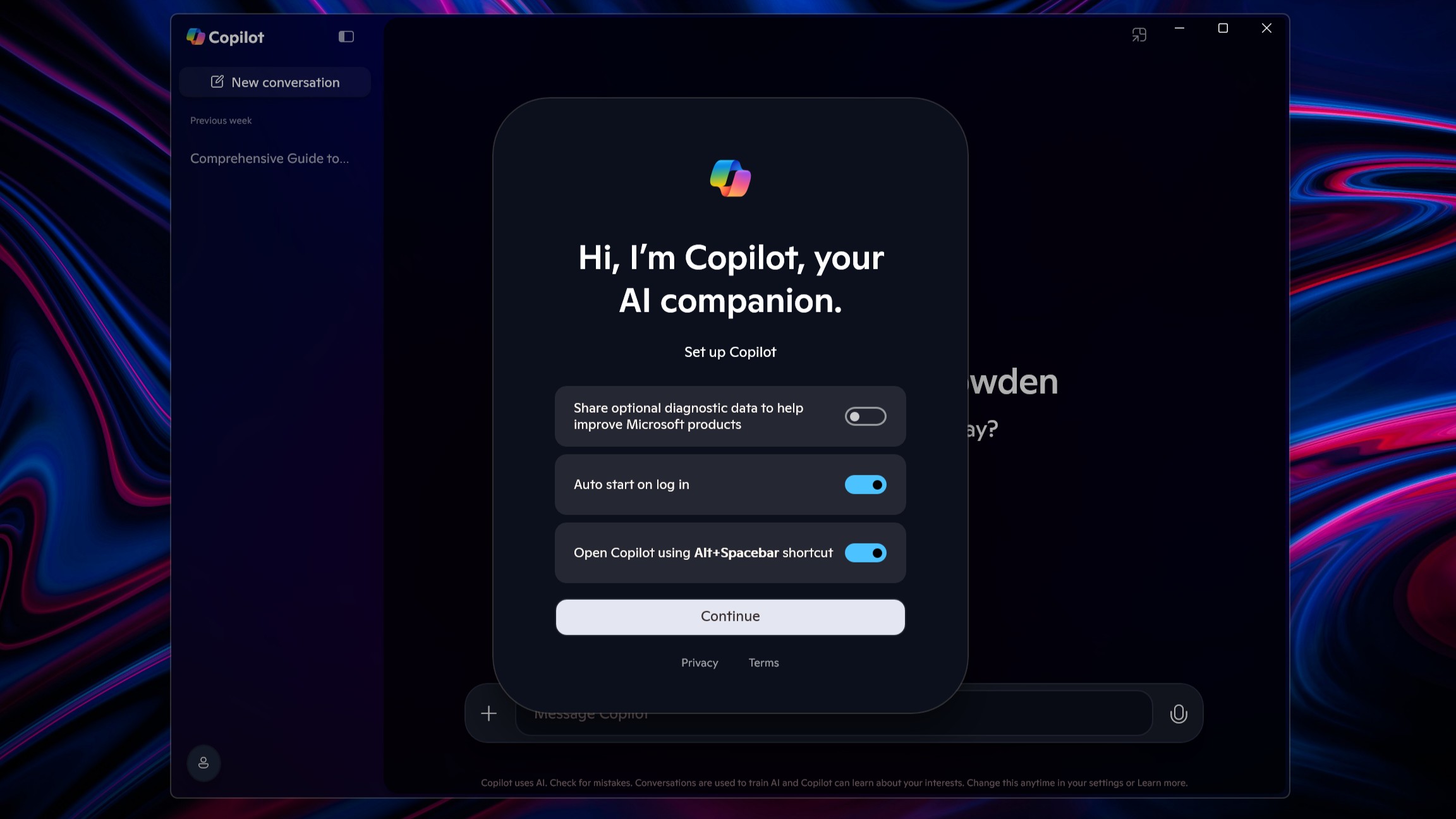Anthem team talks BioWare's learnings, Anthem's ambitions, and future plans
Exploring the struggles and triumphs of Anthem development – and a tease of future plans.
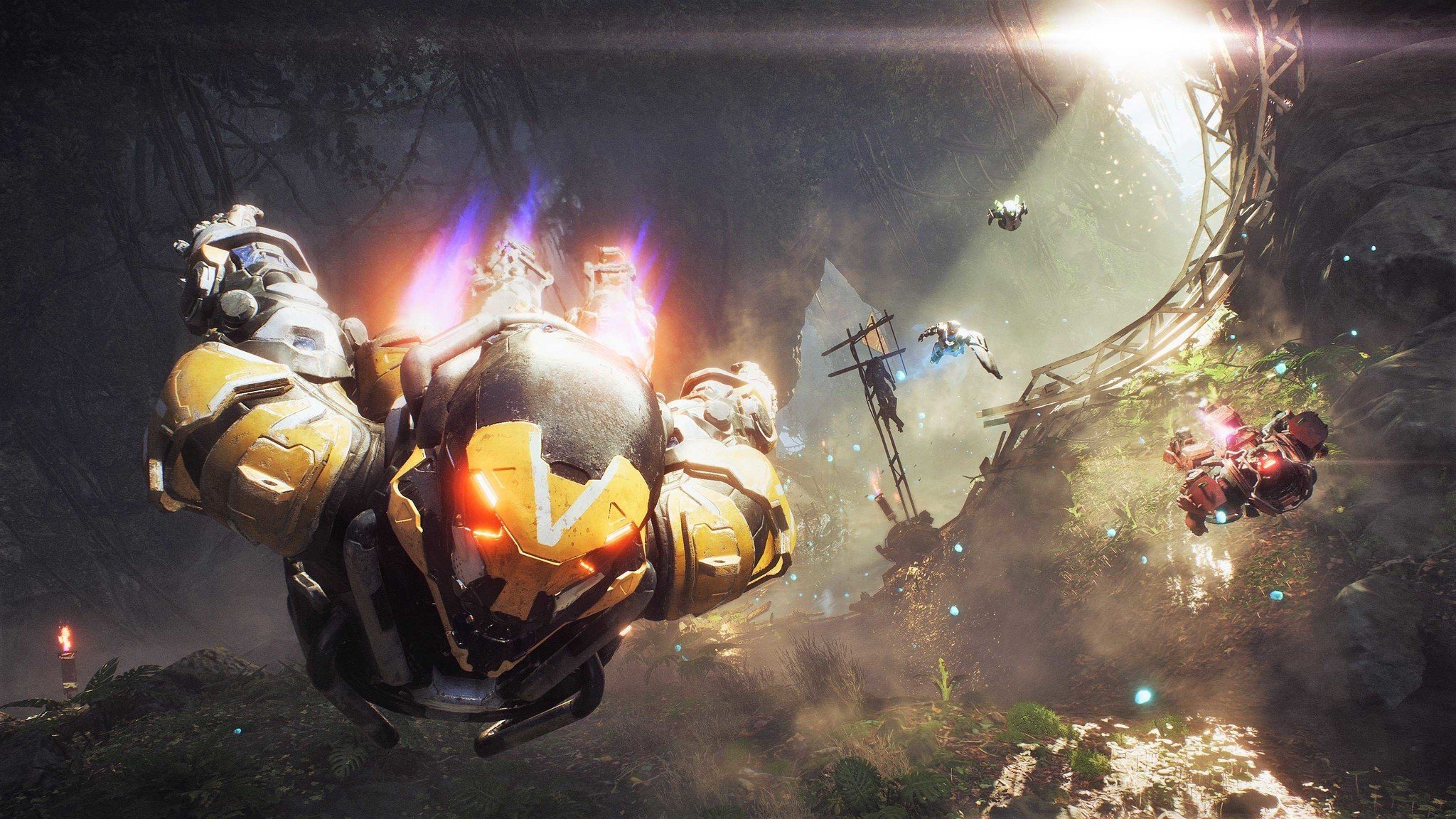
Electronic Arts' Anthem is shaping up among 2019's most anticipated titles, crafting a fresh new property, slated to rival top players in the loot-driven shooters. The shared world role-playing game (RPG) promises a vast open world of class-based combat, intertwined a signature narrative from its developer, BioWare. And with content scheduled for years ahead, it looks to be the hot new release on Xbox One, PlayStation 4, and PC this February.
While extensive previews have established a promising foundation for Anthem, its cryptic world still stows mysteries ahead of launch. We sat down with Anthem lead producer, Ben Irving, gaining a behind-the-scenes look into Electronic Arts' next ambitious project.
The ups and downs of Anthem development
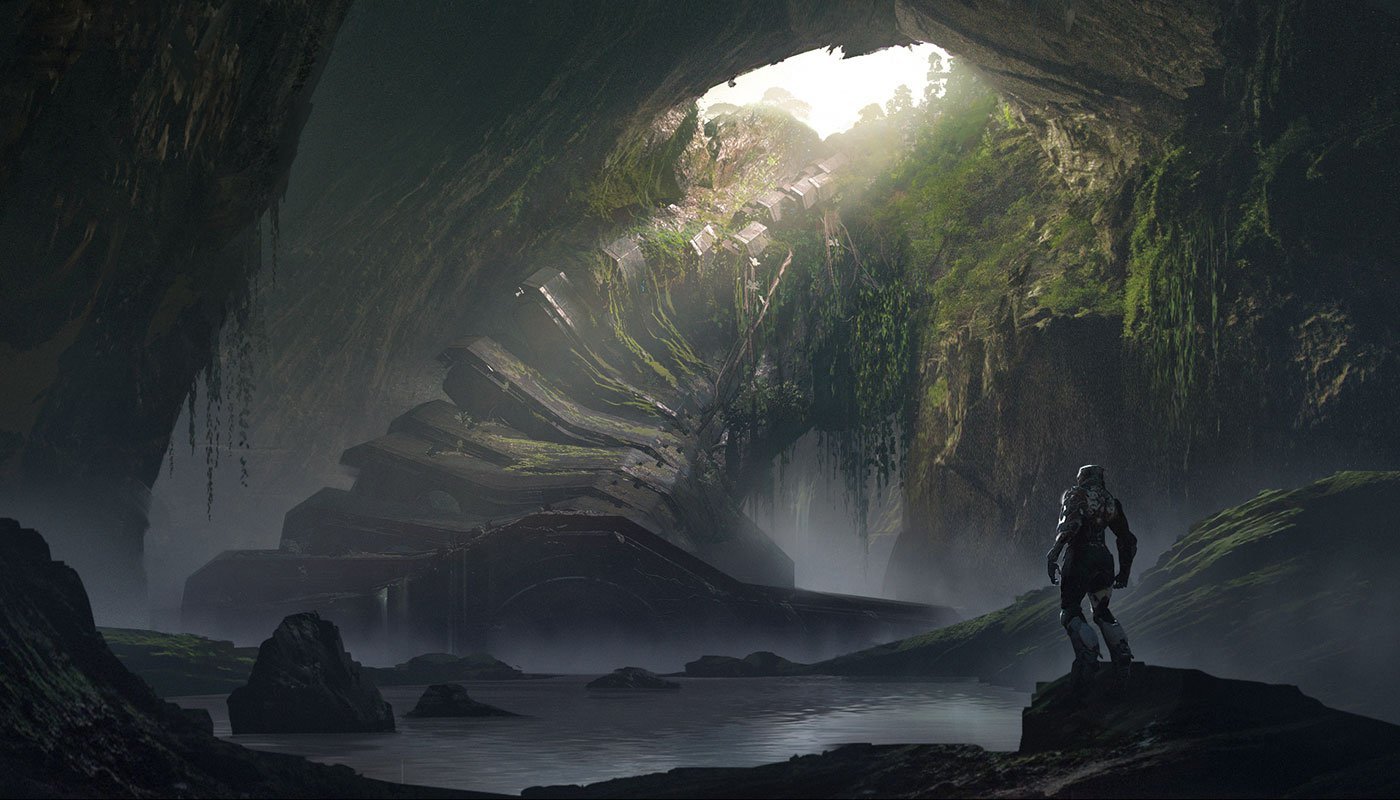
With Anthem's scheduled launch on the horizon, the project has now "gone gold," ready for production, marking a significant milestone for the project. However, adopting a live-service model highlights its ever-changing nature and a shifting perspective at BioWare in 2019.
It's funny though, I promised I wouldn't say this in interviews, but I think I'll say it. We kind of think about it as having a child. There's the pregnancy, and then you have the childbirth, and now you have a baby to take care of for 20 years. Pretty much the start of Anthem is just the beginning.So this is a really big milestone, and it feels amazing to go gold and to be ready to ship this thing. But in many ways, it's just the beginning, right? We have a huge live service we want to support, hopefully, you'll play hundreds and hundreds of hours of the game, for many, many years. So it is a great moment but we're not taking our foot off the pedal, so to speak.
However, since Anthem development kicked off in 2013, the gaming landscape has evolved significantly. Since the project's conception, rival publishers have shipped successful shared-world titles like Destiny and Tom Clancy's The Division. Electronic Arts has experienced a turbulent year, criticized for its aggressive monetization policies, primarily attributed to Star Wars Battlefront II's disappointing sales. And we've even seen significant shifts in the hardware space, kicking off a fresh wave of consoles, paired with a mid-generational pivot to 4K gaming. Irving acknowledged that Anthem has evolved amid these changes while retaining a similar core.
I think at any point in time you have a sum of all your experiences, right? When things happen in games, out of games, you look at the world now. There's lots of stuff to ingest and you apply all those learnings to anything you do. I think in any type of entertainment medium especially. So for us, there's been a lot.But really, the core of the game has been the same the whole time. We want to tell a really amazing and immersive story, in a beautiful and mysterious world, with characters that are relatable. Which is kind of the core of BioWare, that's been consistent in many BioWare games. But then do that in a shared world experience, where you play multiplayer. And then the story, you experience the story together but not just the critical [mainline] path, but also the stories you make yourselves. So if you go out into free play and you discover a Titan, and you have this epic fight; that's the story you created for yourself.So that core of the game has always been the same. The specifics as other games launch, other entertainment launches, things in the world happen, of course, the details have changed. But that core has always been the same the whole way through, which I think is great for us, for a new IP.
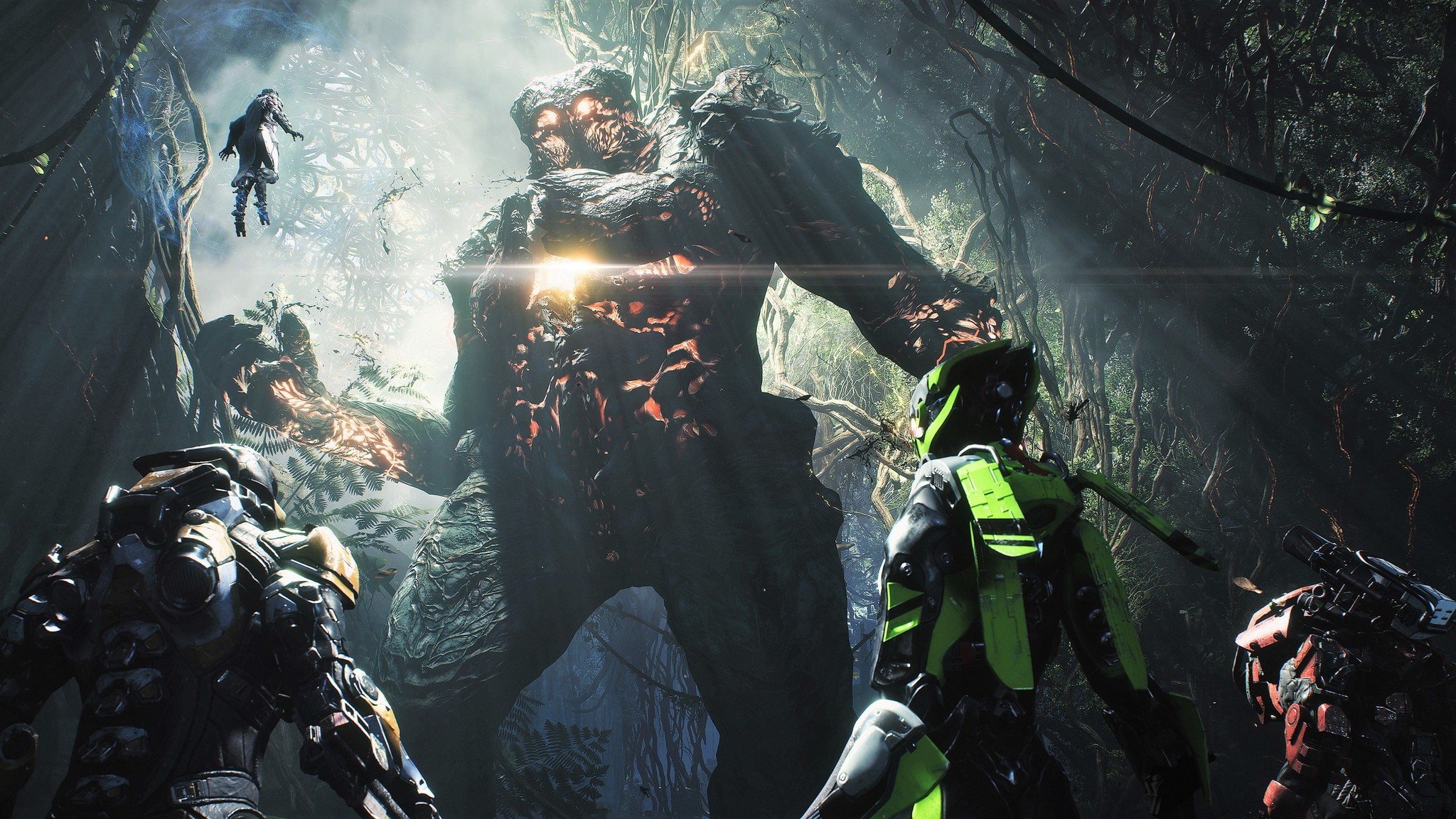
As a studio renowned for its single-player-centric experiences, Anthem is an ambitious direction for the BioWare team. Further expanding, Irving discussed the most notable challenges for the project, explicitly detailing its flight gameplay as a critical hurdle. Now a central pillar of Anthem's open world locomotion and combat encounters, its inclusion meant a studio-wide investment in the mechanic.
I think flight is a huge one. Why don't other games have flight? Because it's really hard and it breaks everything. You put flight in the game and the creatures can't attack you in the sky, so what happens? Can you fly over all the mission objectives and just get to the end? Well, that's no fun. What about the world? It's no fun flying in a flat world.In order for something like flight to be amazing, which is a core part of the game, we have to have a really vertical world. Because flying up, down, around, that's part of the excitement. And the mission structure has to be a way at where there's no point where flying beyond things. You go to points, you do things, you fly. And then the creature behaviors have to be able to shoot you in the sky, when you hover, being non-exploitative.I think for me that was a huge challenge and one of the most exciting things as it took the whole entire team to rally around the idea that yes, this is amazing, and support it. And it wasn't as much as saying, "Oh the dude who made flight, yay, what a hero!" It's really about the whole team contributing to that.
Anthem's pre-release following also aided development, providing the opportunity to rapidly gaining feedback as content unveiled. Key BioWare figures leverage Twitter as the primary face of engaging with the core community, regularly answering questions outside of official channels. They're now the primary source of Anthem news while conveying transparency with fans.
Adopting an open approach also shaped Anthem's launch content offerings, pushing the team to pursue a multiplayer social space dubbed the "Launch Bay." While initially rejected internally, it now aims to complement the existing single-player story hub without splitting player squads.
Get the Windows Central Newsletter
All the latest news, reviews, and guides for Windows and Xbox diehards.
I think Mark Darrah started it, our executive producer, and then people like John [Warner], and Mike [Gamble], and myself have been pretty active as well. Really part of that was because it was such an overwhelmingly positive reaction and, in our head, there's going to be nothing more important when a game goes live than having a core, positive community. So we can build trust with the community, then when there are issues, there will be more trust. Like "Hey, we've told you so much about our decision making [and] thinking, that you'll trust that we'll try to do our best to fix things and continue to communicate." So that's one part of all that.In doing that though, of course, we start to get lots of feedback. There are lots of things we've done, I think the biggest example [was] that we're adding a social hub to the game. That was one of the huge things, from the community, from feedback sessions we've run, all kinds of stuff. It just kept, kept coming back. We didn't think at first it would be right for the game. Like, how would it fit into the construct? And then the more we thought about it, the more we realized, absolutely. This place where you can show off in your Javelins, your personalization options, you can try to form groups, you be there with your buddies. So that's something we added, really, directly based on feedback. And it's a big thing as well.
The challenges of combat in a cooperative world
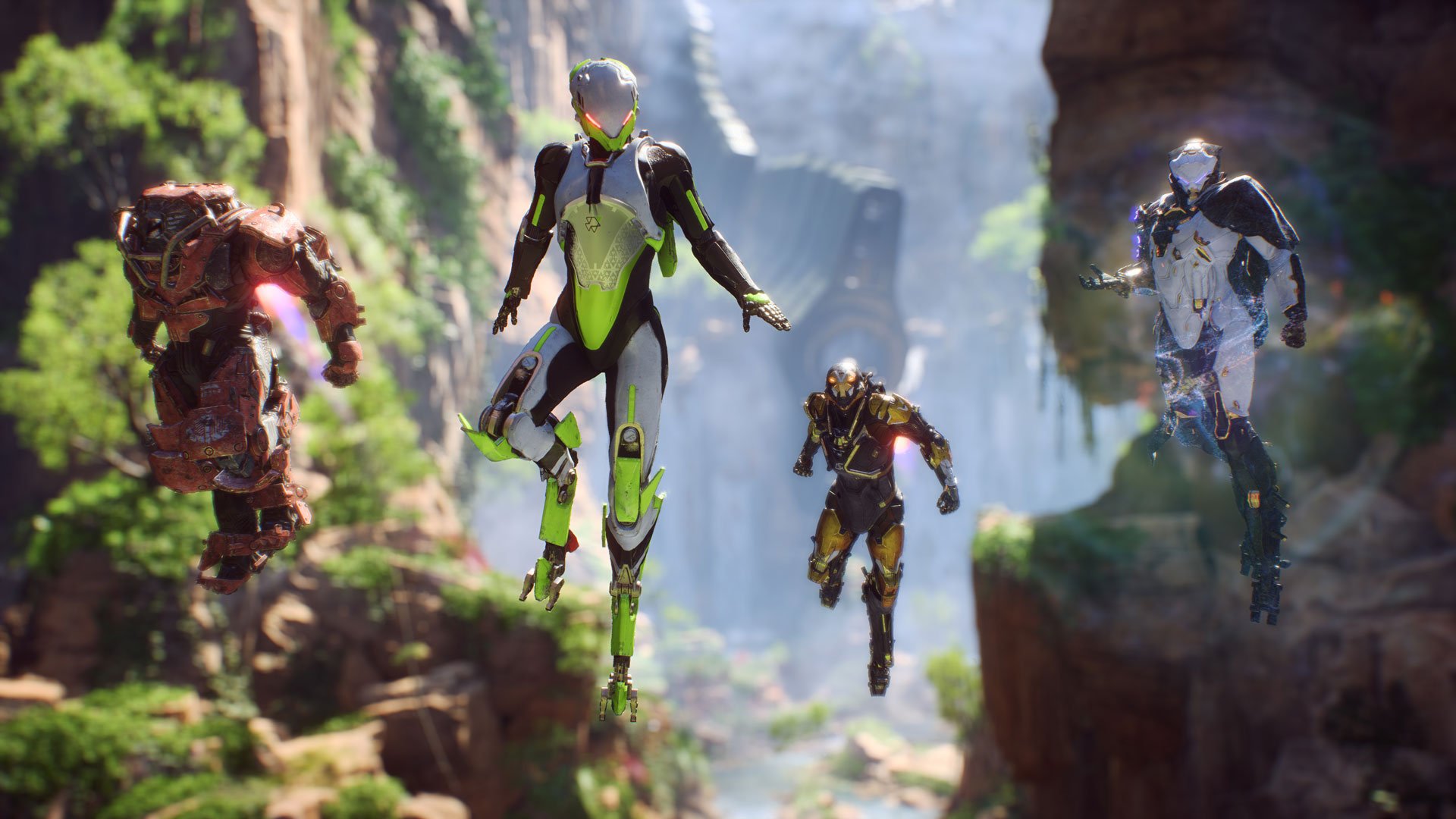
Cooperative play remains baked into Anthem's core, with its class-based loadouts encouraging squads of four players. However, while heavily promoted by BioWare, the studio still accounts for those below this threshold. With the help of combat scaling, the studio aims to deliver a player-versus-environment (PvE) experience that caters to solo freelancers, without compromising cooperative balancing.
So we believe the game is best played with a group of four, I say that sentence a lot. But we understand if people want to play it solo, so we've done a bunch of things to make that a fun experience. But the core experience we aim for is always going to be about having four players. So we do things like, if you have two players, there are less creatures, [while] if there are three or four players, there are more creatures. And then we scale creature health based on one, two, three, or four players. And only certain creatures, right? You want to be able to take on the small guys by yourself, but if you get a Scar Heavy, the guy with the big shield, it's no fun if it's instantly defeated, it's more fun to have four people to shoot at it at the same time.So we did a bunch of scaling like that to cater for solo or less than four, but again, the core experience for us is designed around having four players. The teamwork, the combos, and all that kind of stuff, we think that's where the most fun is.
BioWare has also experimented with transcending its four-player setup, eventually settling on its sweet spot for Anthem gameplay. While not ruling out content with larger player counts later down the line, much of the game's early content scaled around a quartet of freelancers.
We just decided that four was the number for this game. You know, it feels right. Exploring this huge world, in that kind of group size, it's still very big, you can still keep track of where everyone is. It's trickier with high mobility, to keep a group together. So that's where we landed.One of my favorite phrases is "The future is endless and full of possibilities." Who knows if that's something we change in the future, but certainly for launch and the short time afterward, it's four-player content.
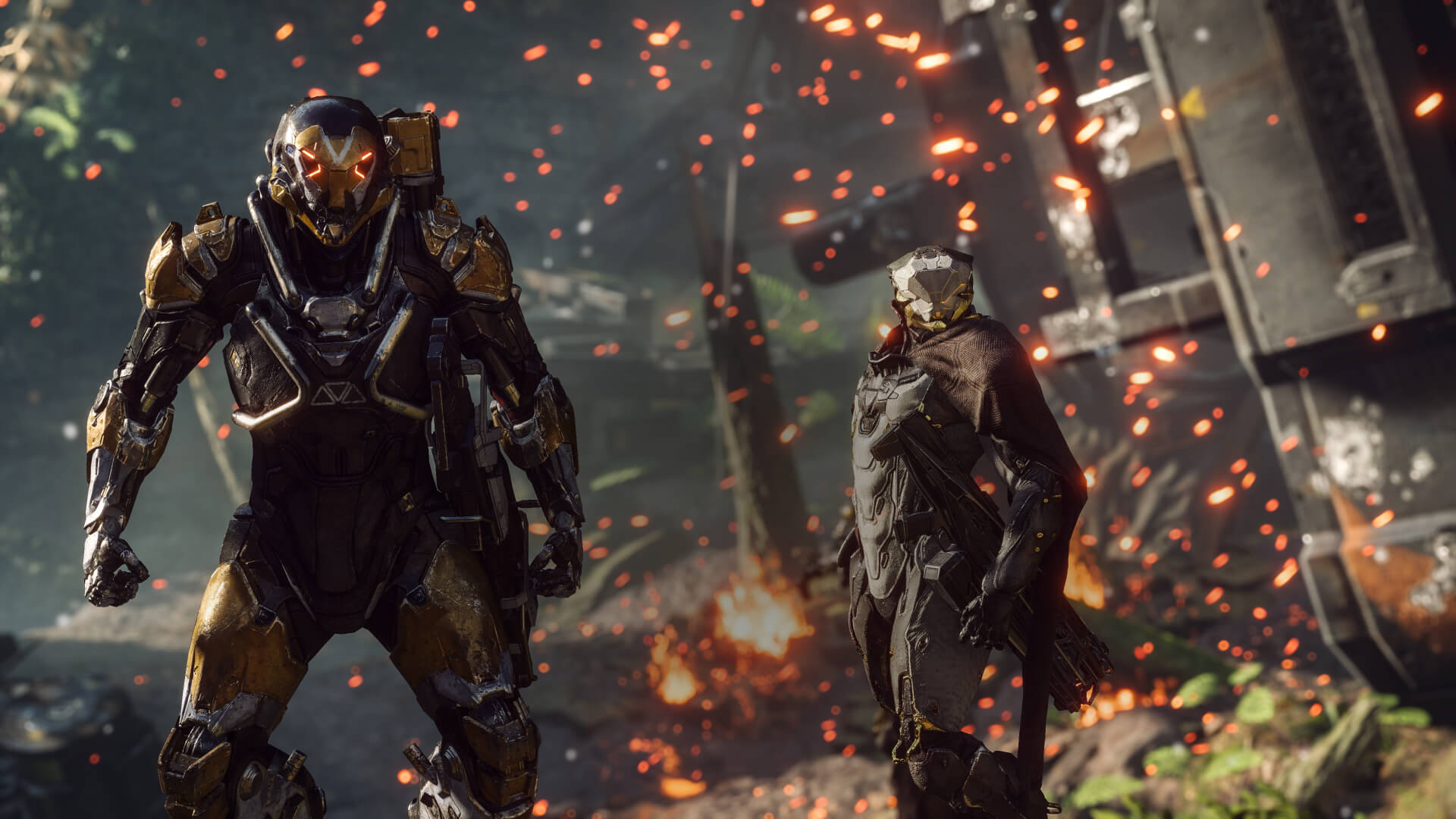
Unlike rivals, Anthem's axes player-versus-player (PvP) encounters too, doubling down on its cooperative sandbox. It's a critical decision that could be a deal-breaker for many, but also allows BioWare to tailor its gameplay for release better. While open exploring PvP, its inclusion seemingly isn't a focus of the team's Anthem vision.
Yeah, one of the most important things to us was the idea of unbounded power and so we wanted that power fantasy to really pay off. That as you play more and more of the game, you really get very powerful. And even [Overpowered], we want you to be OP.So we didn't think we could hit that and then make good PvP at the same time. Because you have to balance PvP so it's fair and those two things were in conflict. So basically the decision was, we think for launch the unbounded power fantasy is more important, and so that's why we didn't tackle PvP. But we're very open to it, I think it will depend on what's right for the game. As we launch the game and we monitor all the player feedback, will it make sense to introduce PvP to the game? Okay, then we can look to do that, and if it doesn't, then well, okay we can not do it also.
Beyond standard difficulty options, Anthem also features a trio of high-tier "Grandmaster" modes for the game's top players. Heavily tied to its endgame, these difficulties further scale combat, positioned among Anthem's hardest challenges at launch. While all unlocked at the game's maximum rank, Level 30, BioWare plans to release two Grandmaster difficulties after the initial launch.
Updated February 8, 2019: In a recent post to Twitter, Irving has stated BioWare now plans to enable both Grandmaster 2 and Grandmaster 3 levels on launch day.
So they all unlock at [Level] 30, but what we're doing is going to turn [Grandmaster] 2 and 3 off at launch, just to make sure nothing weird happens with progression and difficulties. And if anything is looking good against the models we have, then we'll turn 2 and 3 on, or we might look at all the feedback and might go, "Okay, we need to adjust these numbers" make it harder, easier, or whatever. So we'll probably, soon after launch, turn them on. The idea is that the endgame has Grandmaster 1, 2, and 3 in it, as soon as we think it's safe to turn them on.
Shaping the future of Anthem (and beyond)
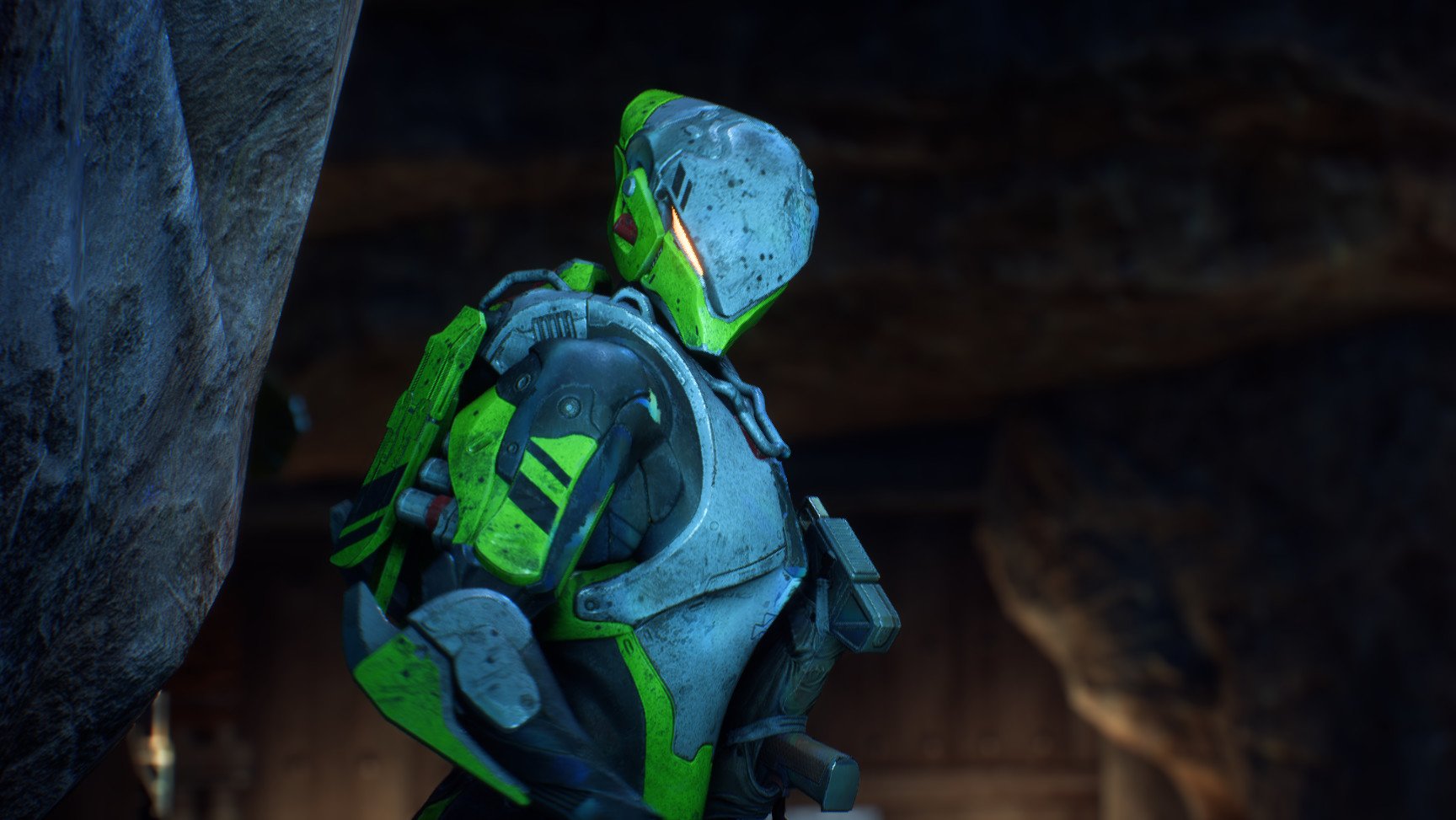
Anthem's live-service approach to its gameplay remains a crucial differentiator, promising "years" of free content ahead, pushing players to invest with confidence. With regular updates scheduled post-launch, BioWare hopes to buy a dynamic, "ever-changing" world for players to explore.
BioWare is seemingly well-prepared to Anthem's future, outlining plans for a full content roadmap, with future story content already mapped. And while unable to rule out a sequel, the studio appears solely focused on scaling this existing foundation and establishing a reliable lifeline for the franchise.
Certainly, the idea in the short term is to update, update, update, update, update. Put all the team we have on making the live service of Anthem as amazing as possible, and then from there, there are so many different ways we can play out.But we definitely wanna make Anthem a game that you come and play for years and years to come. Already, we've mapped out story arcs for several years of the game, so we know exactly where we're going and what stories to tell. And obviously the details aren't fleshed out, that depends on so many things on how the game goes, and what players like and don't like. But we're treating it as something we're all-in on. We think that's really important and we need to also prove that to players, we need to.And there are some things we haven't done yet, but we'll do before launch, like share some post-launch roadmap, and some things like that. We haven't announced stuff like that yet, so I can't share it, but we're certainly working on all that and we realize it's important. I think there are some people who are sitting on the fence who are like, "Hey, if there's a cool live service, I'm in. And if not, I'm not interested." So we recognize that and wanna build confidence in the community that we do have lots of cool, amazing stuff coming. And even the aspirational things you've talked about, we have more Anthem to come, and some brand new stuff that isn't in the game yet that we think will challenge players in really cool and different ways.
BioWare is keen to emphasize plans to distribute all Anthem game updates for free, with hopes of maintaining a healthy, unified player base after launch. With all monetization strictly bound to cosmetics, it circumvents one of the most significant issues facing rivals, with paid expansions packs limiting content to players.
We want game updates to be free. We think that's really important that we don't split the player population from the content. And we're really trying to have a very player-friendly business model. We're gonna monetize vanity, but no loot boxes, no power. You buy what you see and you get what you buy. And so we're hoping when all these things that, people want to engage with the system because it is very player friendly and very optional. And as long as all that works, then it will all be great.
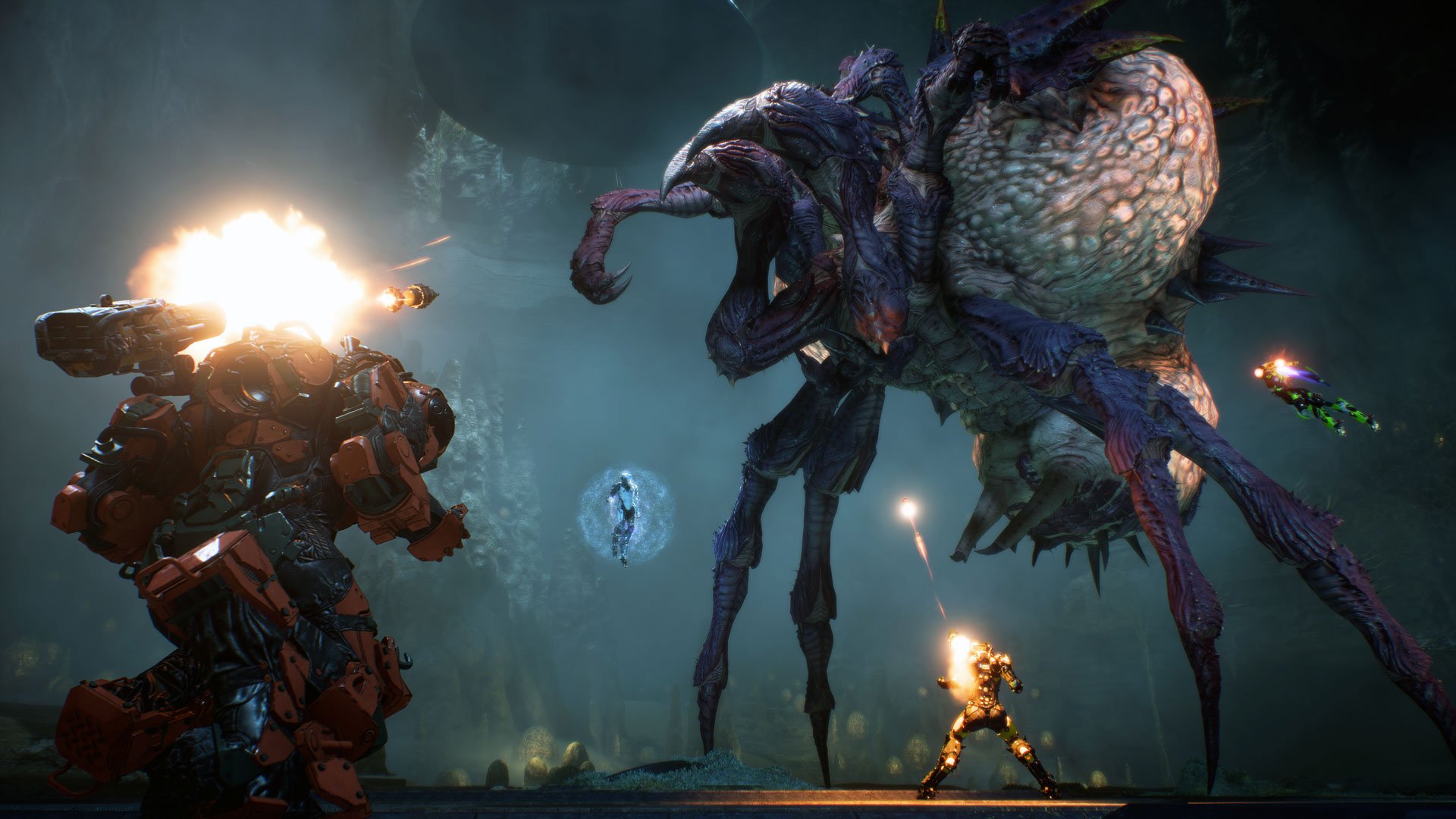
Details on Anthem's post-launch content are thin, and we pushed Irving for a better understanding of what lies ahead. While specifics are limited, the studio is aiming for a balance of smaller-scale updates and more substantial expansions, aimed at varied audiences.
I think in a live service, you need a healthy mixture. I think people want frequent stuff, and frequent stuff has to be smaller, right? You can't do big everything all the time. And then I think occasionally you need a medium thing, and then less frequently, you need a big thing.And they all serve different purposes... I say small, it's relative to how long it takes to build. It can be really big and meaningful to players, but a lot of the frequent updates are about that retention. Keeping players engaged and playing the game. And then the bigger things are about, "Hey, did you leave, you should come back now." And it also works for people playing, because the big thing is cool for them as well.And so our plan is a mixture of these things, and it's a mixture of "Hey, I go out into free play, and there's this cool thing that wasn't there before." And then it's there for two days, and then it goes away. And there's some reward attached to it. That's a really fun evolving world, changing world experience. Other things will be more content, like cool, more content's great. More progression, more itemization, and then again, brand new things you might not have seen before, or new systems that kind of change how progression works. All that kind of stuff for us is on the table, and it's just more about the cadence and the mixture of it. We need to nail down and change based on player feedback and start sharing to the public.
And although BioWare promises a healthy roster of content both for release and beyond, the studio still has secrets to uncover. The infamous phrase, "not at launch" is a frequent response to fan questions. And while neither confirmed or denied, the team is still exploring ideas for what comes next.
"Not at launch" is a funny thing as people are like "Does that mean like, you're not having it or it's confirmed for later?" [...] I don't know, I keep saying "the future is endless and full of possibilities," but honestly normally not at launch means we're saying that's an interesting idea, and we don't have it.And I sent my team all these emails that are like "Not at launch: then I put the thing." We'll put it on a list somewhere, and then we'll review that list and see what makes sense.
Anthem is a big step for Electronic Arts, shaping a new property with the potential for widespread success. Backed by BioWare's game expertise, its imminent debut looks promising, signaling an apparent shift from the publisher's recent troubles.
Anthem is now available for preorder on Xbox One, PlayStation 4, and PC, priced at $59.99, ahead of its slated February 22, 2019, debut.
Matt Brown was formerly a Windows Central's Senior Editor, Xbox & PC, at Future. Following over seven years of professional consumer technology and gaming coverage, he’s focused on the world of Microsoft's gaming efforts. You can follow him on Twitter @mattjbrown.

